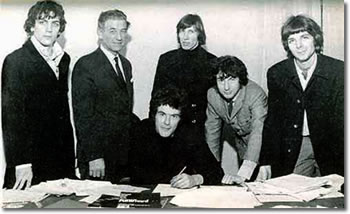Pink Floyd Suing Record Company EMI over Download Royalties
Links – Photos of Pink Floyd signing contract in 1967 at EMI Manchester Square | Discuss the case on Forum | Articles from The Guardian and The Telegraph | Previous story from NPF |
 |
| Click here for Photos of Pink Floyd signing contract in 1967 |
As previously reported, Pink Floyd are suing their record company EMI over a breach of their 1999 contract with the music titan. The breach, the band’s legal representative Robert Howe QC claims, is against one of the terms whereby EMI are not permitted to “unbundle” tracks from Pink Floyd’s albums and sell them separately.
Most fans would probably agree that Pink Floyd songs from a particular album should generally not be listened to separately as they form a single artistic recording in the form of an album. This is why the band put into their 1999 contract that such a practice of “unbundling” is not permitted.
The contract was formed before the advent of iTunes and the like in a time when the sale of a physical album was the norm. As such, it could be interpreted that the contract meant songs from a Pink Floyd album could not be augmented with other songs to form a new physical album. As music platforms like iTunes allow the sale of single tracks from a particular album, this could be considered a material breach of the contract.
“Pink Floyd [are] well-known for performing seamless pieces,” said Robert Howe, the band’s lawyer, at a High Court hearing yesterday. “Many of the songs blend into each other.” To reflect this, Pink Floyd’s renegotiated 1999 contract “expressly prohibits” EMI from selling songs out of context. And yet, Howe argues, EMI “[permit] individual tracks to be downloaded online and … [therefore allow] albums not to be sold in their original configuration.”
“In 1999, when [the contract] was negotiated, iTunes didn’t even exist,” EMI lawyer Elizabeth Jones told Business Week.
“[In 1999] both parties were faced with a whole new world of potential exploitation,” Howe admitted. “It was unclear whether record companies would be selling direct to the consumer or through retailers.” All the same, he said, “[it] makes no commercial sense … [to say the contract] doesn’t apply online”.
Clarification on Contract Sought
Robert Howe QC, appearing for the group, said they wanted to ”know where they stand as a matter of contract”. The case concerns how online royalties are to be calculated.
A judgement on the case at the UK’s High Court is due to be made on Thursday 11th March 2010.
EDIT: Pink Floyd Win Case
Pink Floyd have won a High Court battle to stop their record label EMI selling individual songs online. The band maintained that their contract meant their albums could not be split up without their permission. A judge agreed, saying the contract contained a clause to “preserve the artistic integrity of the albums”.
EMI has been ordered to pay £40,000 ($60,000) in costs, with a further fine to be decided.
History of the Pink Floyd/EMI Relationship
Pink Floyd signed to EMI in 1967 and have had a long and productive relationship with them for most of the history of their various contracts. EMI have released albums such as Dark Side of the Moon and Wish You Were here which form part of a back catalogue which is the second most valuable back catalogue after The Beatles.
Pink Floyd last released a studio album in 1994 in the form of David Gilmour’s The Division Bell. Since that point, the back catalogue has been “monetised” by releasing various anniversary re-mastered editions, DVDs and box sets such as Oh By The Way.
It is likely that Pink Floyd will never release a new studio album again and will almost certainly never tour. Although Roger Waters and David Gilmour will probably continue to release solo material and tour. Indeed, Roger Waters, who officially left Pink Floyd in 1986, has a tour of his album The Wall coming up in late 2010 and 2011.
Remain Informed
If you would like to remain informed of developments in this news story and other news, then please make sure you are signed up to receive the free NPF Newsletter.
Source [The Guardian and The Telegraph ]
